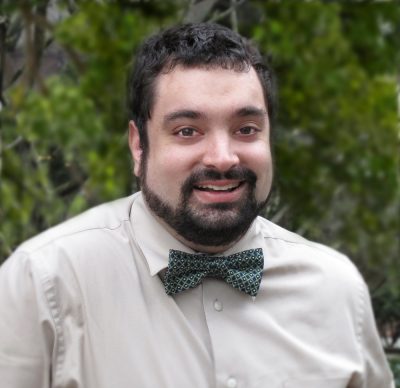What does a lawyer look like?
Chris Czerwonka is an adjunct professor at the Maurice A. Deane School of Law at Hofstra University and an advocate of LGBT and disability rights, but he doesn’t necessarily fit everyone’s image of a lawyer.
“I have a walker, I’m five feet, I move slowly,” he says. “Someone like me doesn’t look like your stereotypical lawyer, the tall white male who projects an image of strength.”
“Someone like me doesn’t look like your stereotypical lawyer.”
While some people subconsciously judge Chris for his physical appearance—“which occasionally happens,” he admits —Chris says that the National LGBT Bar Association has always been a community where his legal expertise foregoes his disability.
“The Bar Association, in particular, is very welcoming and accepting,” he says. “Part of the joy of membership is that those things fade into the background and I have a safe space where I can be upfront with people.”
Getting educated and educating
Chris graduated from Hofstra University School of Law in 2013 and returned to his Alma Mater as a professor in 2016. “Teaching fell into my lap by accident,” he recalls.
During the spring semester of his 2L year, one of Chris’s professors invited him to teach an eight-week course to middle and high school-aged students from educationally disadvantaged backgrounds. By the end of the program, he knew he wanted to pursue a career in teaching.
“What’s funny to me is before then, professors of mine had said, ‘Mark my words, you’re going to be an academic,’ and I would laugh and say, ‘Who, me?’ Fast forward several years later and here I am.”
Benefits of the Bar
Membership with the LGBT Bar has been an asset to Chris in his career as an educator. “I think in order to be an effective law professor you owe it to your students to be at the cutting edge and know the next big thing,” he says.
In particular, Chris says that the Lavender Law® Conference and Career Fair has been a great way for him to stay on top of new developments in the legal and advocacy spheres. “I try to go every chance I get. When I’ve gone, or even heard from members that have gone and reported out, it’s been a wonderful network and springboard for ideas.”
This year, Chris was excited to send one of his own students to the Lavender Law® Career Fair in Philadelphia.
“I always very strongly encourage students to go, particularly if they are going to be on the job market, because it is a great opportunity for students who don’t have name recognition to let people know what they are about, and to interface with people who know it doesn’t have to be a question if they should be out on the application,” he says. “The presence of an employer at Lavender Law says something about who they are as an employer, too.”
“The presence of an employer at Lavender Law says something about who they are as an employer, too.”
Chris believes that presence at events like the Lavender Law® Conference and membership with the Bar are strong indications of both individual and organizational values.
“In this day and age, it makes a statement about who you are and what you value as an attorney,” he affirms. “It makes it very clear you do not intend to stay silent in the continuing undermining, subversion and at times destruction of rights that have been fought so hard for.”
Having a dedication to social justice
This dedication to social justice is a big part of what drives Chris’s membership with the National LGBT Bar Association and his determination to stand with the entire LGBTQ+ community. “As a person with a disability, I find that it imposes more of an obligation to stand up where I see injustice and say, ‘No, this is wrong, and I will not stand by and let it happen,’ even if I’m not the one being mistreated at the moment, because I know what that feels like,” he says. “I won’t let others be victimized by individual people or by broader systems as a whole.”
“‘No, this is wrong, and I will not stand by and let it happen,’ even if I’m not the one being mistreated at the moment, because I know what that feels like.”
When he is not teaching, Chris puts his dedication to social justice to work advocating for LGBT and disability rights. “I’m active in doing name change advocacy and pro bono work with various outfits,” he says. “I’ve also done advocacy work traveling to communities and spreading the word on LGBT rights.”
Chris is particularly interested in the intersection of LGBT and disability law, and right now, he is working to identify ways that disability law could be credibly deployed in the service of transgender litigants.
“As far as I know, it’s not a crowded subfield,” he says of his research. “One of the things I hope for in my travels, both in general settings and with people who don’t have LGBT advocacy specialties, is that hearing what I have to say may inspire others to look at these intersections. The more people who are doing it, the better we are in the long run.”
At the end of the day, the LGBT Bar provides the network Chris needs to connect with other advocates and stay up to date with the tireless struggle for legal equality.
“It’s a challenging time to do this work,” he admits. “Having a community of people that I can turn to when I get frustrated or need to bounce an idea off someone has been invaluable.”

